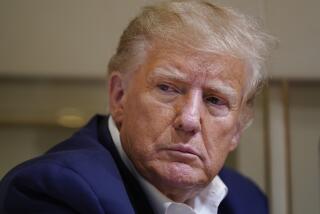Bomb Plot Informant Taped Talks With Agents : Court: Prosecution says clandestine recordings don’t compromise its case against 11 defendants. Judge declines to turn material over to defense.
NEW YORK — Prosecutors confirmed Thursday that Emad Ali Salem, the government’s informant in the alleged plot to bomb the United Nations and three other major New York City targets, secretly tape recorded some conversations with federal agents. But a judge declined to turn the tapes over to defense lawyers trying to prove entrapment.
In a letter to federal Judge Michael B. Mukasey, U.S. Atty. Mary Jo White said that Salem, a former Egyptian army officer, “made some recordings of his own.”
But the prosecutor stressed these tapes in no way compromise the government’s case.
“The government understands that the defendants contend, at least in part, that they were entrapped by the government’s informant and were really not otherwise disposed to plan bombings, murders, kidnaping, hostage taking and the myriad other terrorist activities they spoke about in this case,” White said.
But she added none of the tapes Salem secretly made during meetings with his handlers “as we currently understand them, even begins to suggest that the defendants are not guilty of the charges in the indictment.”
The U.S. attorney said prosecutors did not obtain the tapes until after the active phase of its undercover operation, but that they are preserved “and will be turned over at the appropriate time in discovery.”
During a court session attended by the 11 defendants in the multibomb plot, whose targets prosecutors charge included the Holland and Lincoln tunnels beneath the Hudson River and the federal building containing the local offices of the FBI, members of the defense team demanded immediate access to the tapes.
William Kunstler, representing two of the defendants, told Mukasey he learned that Salem revealed the existence of the tapes as he was about to be placed in the federal witness protection program. Kunstler said the informant told law enforcement officials there were tapes in his apartment that should be seized.
But the judge ordered prosecutors not to turn over the tapes to the defense “pending further orders from me.”
After sparring between defense and prosecutors over news leaks in the case, Mukasey ordered the Justice Department’s Office of Professional Responsibility and the FBI to investigate the source of the leaks.
The judge also ordered all supervising investigators to provide him by next Wednesday with a list of contacts they have had with reporters.
“The point of the rules is so we can pick a jury based on the evidence heard in the courtroom, not on some half-truths or outright fiction portrayed in the media,” Mukasey said, then adding, “I do not believe all of the disclosures have originated with government agents.”
In her letter to the judge, White said she shared the dismay “or at least the expressed dismay” of defense counsel over the types of information that have found their way into the media. She said the revelation that Salem had made private tape recordings “would almost of necessity have come from someone with access to investigative information.”
” . . . while the behavior of some unidentified government personnel here is not something about which we are proud,” White continued, “the defense has not been exemplary in its performance either.”
She noted that it was not until shortly after copies of transcripts of tape recordings Salem made with various other defendants were turned over to defense lawyers that they appeared in the media.
More to Read
Sign up for Essential California
The most important California stories and recommendations in your inbox every morning.
You may occasionally receive promotional content from the Los Angeles Times.










